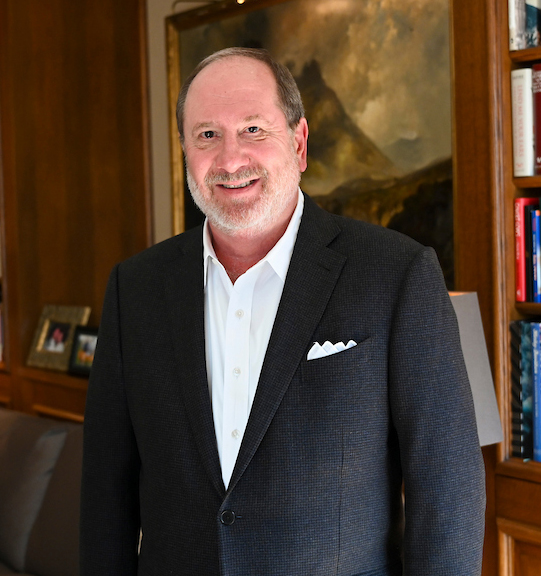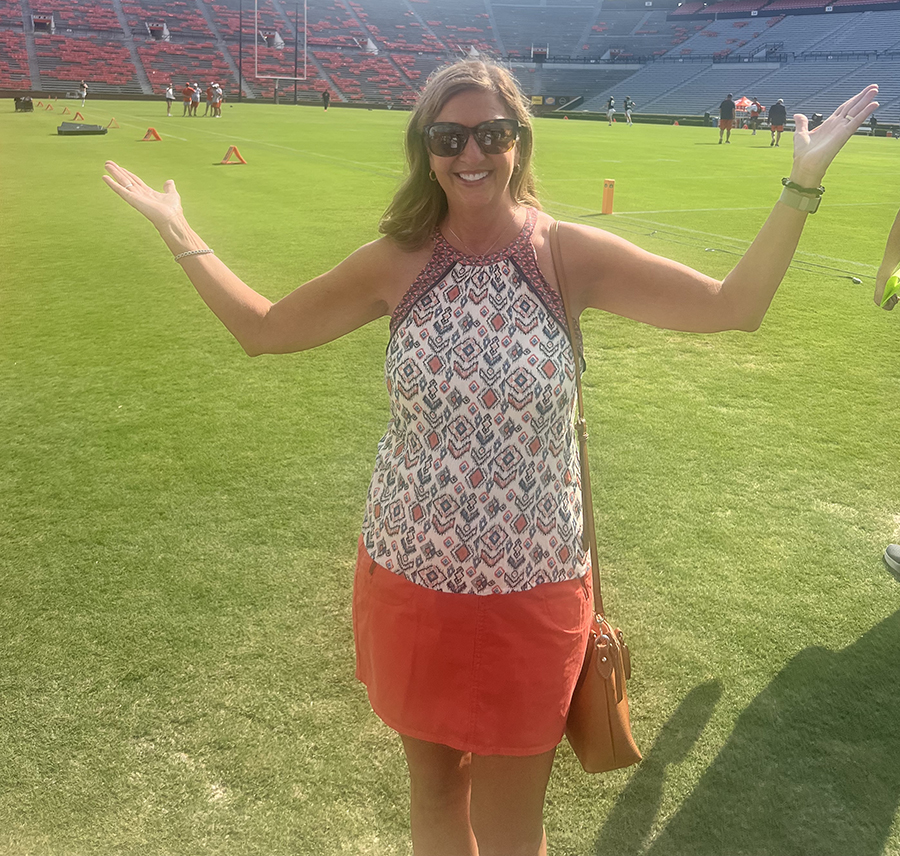
Editor's note: The Harbert College of Business is committed to developing a vibrant entrepreneurial
ecosystem for students, faculty, industry, and alumni that will fuel new venture creation.
The story that follows is one of eight in a series entitled, "Inspired Entrepreneurship."
Showcasing the experience and expertise of Harbert alums who have created successful
business enterprises of their own will help equip our students for entrepreneurial
success.
“ Go out, get some experience, try to figure out what type of business you want to
start and then go and do it, because once you hit 28 years old, 35 years old, and
you have a family with kids, it makes it very, very challenging."”
Scott Bell, founder and CEO of Bell Media, traces the origins of his successful digital
advertising agency to well before he enrolled in the Harbert College of Business’
Entrepreneurial Program back in his junior year at Auburn.
“I was raised in an entrepreneurial family,” said Bell, who received his B.S. in Business
Administration, Entrepreneurship in 2007. “My father was a golf pro who took the opportunity
to purchase an underperforming golf course in Montgomery and over 10 to 15 years turned
it into a successful, profitable business. And my mother was an entrepreneur as well,
although not in the stereotypical sense. She built her own private practice in marriage
and family therapy, and then transformed that into the only child therapy practice
in the area. I saw the entrepreneurial spirit – and all the crazy hours of work it
took to make them successful - at work from a very young age.”
The Harbert College of Business sat down with Scott as part of its Harbert Entrepreneur
Spotlight initiative to hear his story and glean some valuable insight for aspiring
student entrepreneurs.
HCOB: You started Bell Media right after graduating from Harbert – can you tell us about
that decision and how you got your business off the ground?
 |
After Scott Bell graduated from the Harbert College
of Business, he and his brother, Neil, started Bell
Media to focus on the underserved need for digital
billboards in the south.
|
Bell: Beginning in my junior year at Auburn, I went to the entrepreneurship program, where
we had to start working on business plans and the whole strategic planning processes.
And I was really interested in digital billboards – I began seeing the digital roadside
billboards pop up around 2006, 2007 for the first time. My brother, Neil, who graduated
from Auburn in 2001, was in the billboard business, working for one of the largest
companies in the industry as well as building some of his own billboards, so I already
knew a little about that market.
As I started looking into it, I realized that from a governmental perspective, you
could not build billboards in the Auburn area, but they were allowed in Columbus,
Georgia. So, I started learning about the legal aspect of the billboard business there,
asking a lot of questions – how do I lease property and how do I permit a billboard,
etc. And I started traveling my senior year over to Columbus to begin leasing property
and permitting property to build billboards, relying on my brother to help guide some
of those initial transactions.
HCOB: So, you were already “in the business” before starting Bell Media – when did you
form the company and what was your process?
Bell: Yes, that’s right. After I graduated, my brother and I started Bell Media in 2008
with the focus on digital billboards. It was obvious to me that Columbus was an underserved
market and that the main competitor, a nationwide company, was not investing in digital
billboards. I assessed that there may be a two- or three-year window of opportunity
where we could get in and establish a digital billboard network around the city –
build and own something that would create value and continue to generate recurring
revenue using tangible, hard assets. And over the next seven years we expanded our
footprint to other markets in surrounding areas.
HCOB: How did you fund your initial operations – where did you get the money to lease these
properties, purchase the permits and build the billboards themselves?
Bell: The year before we started the company, I had secured some lease agreements and some
permits to build billboards, some of which I came to realize weren’t in very good
locations. So, I sold those for $7,000 apiece, which gave me enough to live off for
the first six months. I held onto a handful of other leases and permits I felt were
more promising. With those in hand, we investigated funding sources, and settled on
a mezzanine financing lender that offered us a one hundred percent financing structure
because we were creating an asset-based business. It was, in effect, a secured loan
at 12% or 13% interest, which gave us enough funding to build a few billboards where
we already had the leases and permits in place and start generating revenue. From
there we were off and running.
HCOB: Can you tell us a little about what you had to do to secure that financing – did
you develop and submit a comprehensive business plan?
Bell: Not really, we didn't have a comprehensive business plan, per se, but we had a strategic
plan which painted a picture of who we were, what market we wanted to tackle, the
economics behind the business and a go-to-market playbook for how we wanted to acquire
customers. But we didn't go through the whole process of developing that 30-page business
plan.
 |
Scott Bell, right, sold the outdoor profile of the Bell Media business to
Link Media, keeping the indoor advertising portion as they moved into
the online advertising space.
|
HCOB: Fast forward seven years to the sale of a portion of your company to Link Media –
what did you sell and why?
Bell: We sold the outdoor portfolio of business to Link Media, keeping the indoor advertising
portion as we decided to move into the online advertising space. At that time, we
had built a customer base of some 200 small to medium sized businesses, and we were
starting to get questions from these customers about foundational aspects of digital
marketing, such as how does pay-per-click work? Do I need to invest in paid search?
What is SEO? And that was really the light bulb moment for us as we were selling the
billboard company – this is going to be the next stage of our business.
HCOB: You started a digital advertising agency when that market was well-established, with
major players devoting tremendous resources to this space – what made you think you
could succeed there, particularly without much in the way of online experience?
Bell: I think it's important to note that we operated in markets that, from a digital perspective
and a technology perspective, were probably five to 10 years behind more progressive
markets in major metropolitan areas. What we saw in these markets was that people
were curious and when people are curious, it shows that maybe there's a potential
need. So that's how we got interested in the digital space.
To address this opportunity, I went to work hiring experts in the field, including
several team members with many years of experience at major digital media outlets.
We soon found that the big digital agencies were selling their product a certain way
that we didn't really agree with – that didn’t fit the needs of our customers. We
felt that the approach they were using – selling pre-determined packages of services
– sets an incorrect expectation from the client's perspective, one that results in
a churned customer. So, we started selling digital advertising in a different way,
and I think that is what helped us gain traction over the last four years.
HCOB: Looking back to your time at Auburn, were there any mentors or faculty that you can
point to that stood out to you as being in any way transformative in your thinking
and entrepreneurial process?
 |
Scott Bell's time at Harbert forced him to become comfortable
with verbally expressing the nuts and bolts of his thinking. "When
I came out of Harbert, I had already made close to a hundred
speeches, and that experience has shaped how I lead meetings
and discussions to this day. That was probably the biggest
impact of the entrepreneurship program at Harbert for me."
|
Bell: I would say in the beginning, the best resource I had was my brother, Neil, because
he had already been in the billboard business for three or four years and he was always
there to help. As for Harbert, I would point to Dr. Michael Kincaid – everything we
did in his classes was in a speech format. He told us, “You're not in here to read
books. You're in here to experience getting in front of people and talking about your
business and pitching it.” When I walked into his class, I was afraid of speaking
in public. But he said that everything that you do is going to be in a presentation
format. It forced me to become comfortable with verbally expressing the nuts and bolts
of my thinking. When I came out of Harbert, I had already made close to a hundred
speeches, and that experience has shaped how I lead meetings and discussions to this
day. That was probably the biggest impact of the entrepreneurship program at Harbert
for me.
HCOB: One final question – what advice would you give to students considering an entrepreneurial
career path? Would you recommend they jump right into starting their own business
as you did right out of college?
Bell: I wish I had the definitive answer. On the one hand, there’s a lot of value in going
to work in a normal work environment where you can experience personal and professional
growth, a good manager that can show you the best method for how to lead, mentor,
train and coach. That is something that you simply cannot get if you step out your
first day out of college and begin running your own business. So, if you decide to
go in that route, you're going to have to find other ways to develop your leadership
and management abilities outside of the work environment – which is what I did.
As for the optimal time frame? For me, the ideal time is two or three, maybe four
years after graduation, depending on the industry. That said, there may not be the
perfect time for everyone. My best advice is to go out, get some experience, try to
figure out what type of business you want to start and then go and do it, because
once you hit 28 years old, 35 years old, and you have a family with kids, it makes
it very, very challenging.


 Degrees & Programs
Degrees & Programs
 Faculty & Staff
Faculty & Staff
 Career Development
Career Development
 Recruiters & Industry
Recruiters & Industry







